Israeli Jewish perceptions of the IP conflict
From a study conducted by Rafi Nets-Zehngut (Teachers College, Columbia University) and Daniel Bar-Tal (Tel Aviv University), Summer 2008, "Israeli Jewish perceptions of the Israeli-Palestinian conflict," polling data that shows that many old Zionist myths still endure -- as well as some new ones. I've picked out a few of those outlined that struck me.
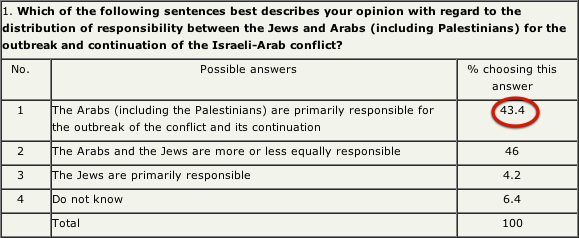
Mostly shared responsibility, but also a large number that believes the Arabs were primarily responsible, presumably because they rejected the UN Partition Plan. Of course there should have never been a UN Partition Plan or a colonial project in Palestine, but that goes over the heads of most people.
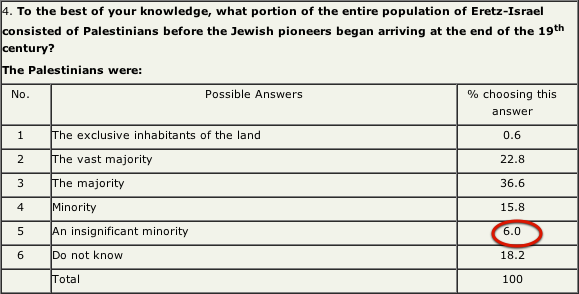
It's still staggering to see the 6% of Israelis believed that Arabs were a minority in the late 19th century, when Zionist immigration began. Obviously the "land without a people for people without a land" myth endures. In fact, Arabs amounted to 94% of the population in 1880. Even in 1948 they accounted for over 70%.
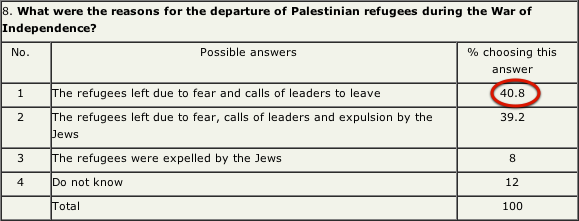
Despite Benny Morris and the historical revisionists of Zionism, most Israelis still believe the Arab refugees left of their own free will rather than because of massacres and ethnic cleansing.
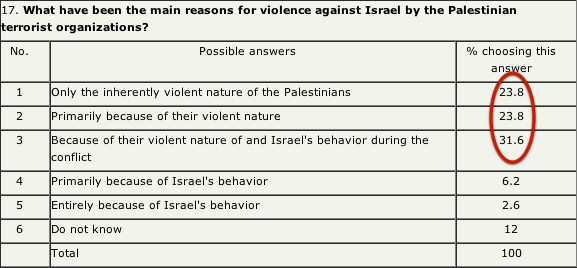
They simply don't get "occupation."
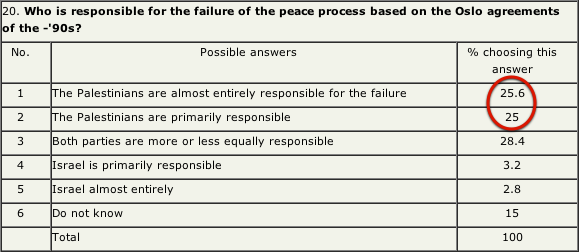
While the largest group finds responsibility on both sides, a majority see it primarily or entirely on the Palestinian side. Considering the Israelis were vastly more powerful and underwent a change of government in 1996 that led to Benyamin Netanyahu's butchering of the Oslo process (with his pals in the Clinton administration), this is pretty rich. On the other hand, it may reflect the impact of Palestinian suicide bombing campaigns during that time - esp. the (mostly) Hamas bus bombings of 1993-1996.

Another strange one reflecting Israeli propaganda about Egypt's cold peace. But what obligations have the Egyptians actually failed to implement? And why not ask if Israel has failed to implement the parts of Camp David having to do with making peace with Palestinians?
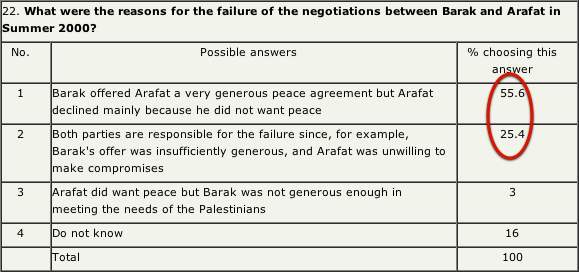
Most blame for Palestinians, despite several counter-narratives to the Clinton-Barak-Ross explanation (more on this below).
There is more info on the poll in this press release, in which the authors say:
I'd love to see a similar study for Arab Israelis, non-Jewish residents of the West Bank and Gaza as well as in the Palestinian diaspora.

Mostly shared responsibility, but also a large number that believes the Arabs were primarily responsible, presumably because they rejected the UN Partition Plan. Of course there should have never been a UN Partition Plan or a colonial project in Palestine, but that goes over the heads of most people.

It's still staggering to see the 6% of Israelis believed that Arabs were a minority in the late 19th century, when Zionist immigration began. Obviously the "land without a people for people without a land" myth endures. In fact, Arabs amounted to 94% of the population in 1880. Even in 1948 they accounted for over 70%.

Despite Benny Morris and the historical revisionists of Zionism, most Israelis still believe the Arab refugees left of their own free will rather than because of massacres and ethnic cleansing.

They simply don't get "occupation."

While the largest group finds responsibility on both sides, a majority see it primarily or entirely on the Palestinian side. Considering the Israelis were vastly more powerful and underwent a change of government in 1996 that led to Benyamin Netanyahu's butchering of the Oslo process (with his pals in the Clinton administration), this is pretty rich. On the other hand, it may reflect the impact of Palestinian suicide bombing campaigns during that time - esp. the (mostly) Hamas bus bombings of 1993-1996.

Another strange one reflecting Israeli propaganda about Egypt's cold peace. But what obligations have the Egyptians actually failed to implement? And why not ask if Israel has failed to implement the parts of Camp David having to do with making peace with Palestinians?

Most blame for Palestinians, despite several counter-narratives to the Clinton-Barak-Ross explanation (more on this below).
There is more info on the poll in this press release, in which the authors say:
“Typically, societies involved in intractable conflicts like the Israeli-Arab/Palestinian conflict adopt a collective memory of the conflict that is biased to a large degree and self-serving, as is part of the Zionist narrative,” says Nets-Zehngut. “If such study had been conducted between the 1950s and the 1970s, surely a much higher percentage of Israeli Jews would have held the Zionist narrative. The fact that we found this memory of the conflict to be somewhat critical (even though the conflict is still going on) is encouraging. It suggests that the Israeli-Jewish society has changed to become more critical, open and self-reflective, allowing it to adopt less biased narratives.”
However, Daniel Bar-Tal believes that the Israeli-Jewish society still has a significant way to go in changing its collective memory to become less biased and self serving. Many Israeli Jews still believe a Zionist narrative of many issues in the history of the conflict – a simplistic memory of the conflict which portrays Israel in a positive light and the Arabs/Palestinians in a negative one. “Holding such a Zionist narrative serves as an obstacle to peace since it promotes negative emotions, mistrust, de-legitimization and negative stereotypes of Arabs and Palestinians,” Bar-Tal said.
For example, regarding a more recent event – the failure of the Summer 2000 peace negotiations between then Israeli Prime Minister Ehud Barak and Palestinian leader Yasser Arafat – Israeli Jews took a harder line. Fifty six percent believe that Arafat declined a very generous peace offer by Barak because he did not want peace with Israel, versus only 25% who believe both parties were responsible for the failure and 3% who believed that Barak was responsible. Likewise, 60% replied that in the 1947 United Nations' partition plan of the Land of Israel/Palestine the Palestinians received an equal or larger part of the territory, relative to their percentage of its population. However, the facts are that the partition plan, which was rejected by the Palestinians, offered them (about 2/3 of the total population then) a smaller part of the territory (only 44%).
The study found older people, and the more religious ones to be more likely to believe the Zionist narrative. Further more, those supporting the Zionist narrative were significantly less likely to support peace agreements with the Palestinians and Syria – pointing to the important role of collective memory in conflicts. In addition, a strong connection was found between the collective memory of "past Jewish persecution" (regarding anti-Semitism and the Holocaust) and the diagnosed collective memory of the conflict. People holding a significant memory of Jewish persecution are much more likely to adopt a Zionist narrative. This memory of persecution is discussed as one of the determinants of Israel's conduct along the conflict – and this study provides support for its impact.
I'd love to see a similar study for Arab Israelis, non-Jewish residents of the West Bank and Gaza as well as in the Palestinian diaspora.
